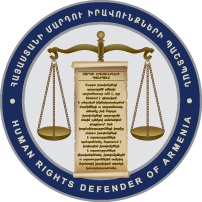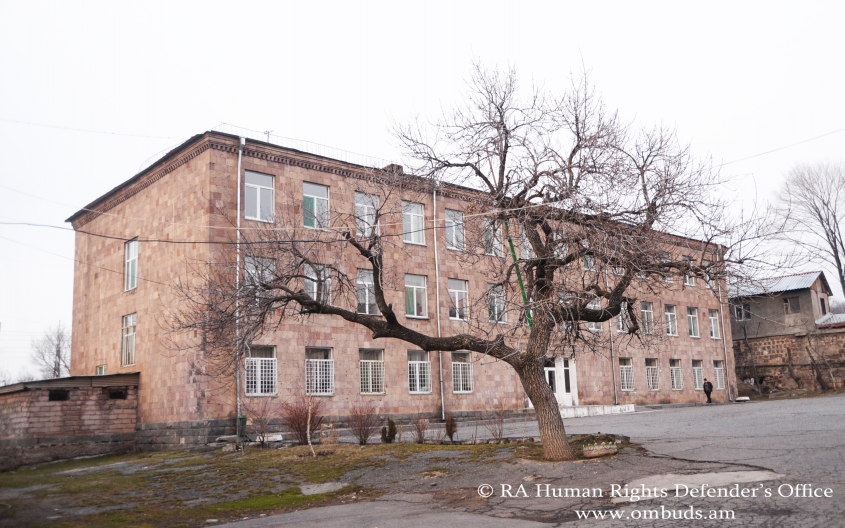The Human Rights Defender has summed up the results of the monitoring visit of the “Dzorak” mental health care centre (hereinafter referred to as Centre) of the RA Ministry of Labour and Social Affairs. They have been subjected to detailed analysis from the point of view of compliance with RA legislation and international standards. A large-scale document has been prepared that will be presented to the Centre’s Directorate, the Ministry of Labour and Social Affairs, the Ministry of Health, as well as to the General Prosecutor's Office with the necessary justification, objective evidence (photocopied documents, photographs, etc.) and concrete recommendations of work to be undertaken.
The main violations and issues registered in the Centre are as follows:
- use of restraint and medical intervention measures not envisaged by law (mixture or medication allowed by the order of the Minister of Health), as well as breaches of procedure for the application of these measures,
- breaches of procedure for the application of the isolation measure defined by the RA Minister of Health on persons with mental health problems, including in a form of a degrading treatment towards the person under care,
- out of date (vanilla, natural juice, honey, candies) and unmanaged (preserved) products, including food items with a shelf-life of more than one year after the expiration date at the time of the visit have been found, as well as issues related to the variety of foodstuffs and the facility of less food than envisaged,
- expired medical drugs (including medicine with expiration date expired a year and a half ago at the time of the visit) and medical items were found,
- violations of the maintenance and abolition of drugs have been registered,
- there are violations of medical waste collection and storage procedures,
- the Centre’s caretakers are not provided with dental, including proper dental prosthetic services,
- shortcomings in preventive medical care and services, including screening for infectious (tuberculosis) and non-infectious (hypertension, diabetes, etc.) diseases. For example, a fluorographic examination is carried out upon a caretaker’s complaint, while it should be implemented on a regular basis and for preventive purposes,
- the Government Decree No. 1292-Ն of 29 October 2015 provides for a regular medical examination of persons undergoing primary care in a special type of a nursing home. The decree also states that a relevant order and periodicity should be established, however such a procedure is not established (even by the Ministry of Labour and Social Affairs),
- overcrowding has been recorded in the Centre. As a result, the caretakers are not provided with personal, including housing space, which directly affects their right to personal life,
- there is a need for improvements and renovation of the infrastructures, including sanitary and hygienic conditions (baths, toilets, living rooms, etc.) of the Centre,
- not all buildings of the Centre are adapted for those with mobility problems. Particularly, in addition to patients with no mobility possibility, the rest of the caretakers attend a canteen on the 2nd floor of the Centre’s second building. During the monitoring, it was reported that caretakers were approaching the dining room building with wheelchairs, leaving the wheelchairs in front of the building and walking with difficulty, leaning on one another and the walls, and climbing to the lounge. Even though they were receiving help from the staff, that is considered degrading for persons with disabilities,
- it was noted during the monitoring that in cold weather conditions (main monitoring was carried out in December) there is no adequate 24-hour heating,
- the toilets in the Centre are not adapted to the needs of people with mental health problems. For instance, in one of the bathrooms, the Asian-style bathroom and toilet are not separated by a wall and are very close to each other, and the rest of the toilets are placed at the height of one foot above the common ground, which may cause additional difficulties, for example, for people receiving psychotropic drugs to maintain mobility and balance;
- caretakers are no provided with the opportunity of full access to telephone communications,
- in certain institutions, including psychiatric organisations, and, in the particular case, in the Centre, one of the most important components of the human rights protection is the issue of improving the social guarantees and working conditions of employees, the need of which has been re-established during the above-mentioned visit,
- the medical staff of the Centre is insufficient,
- there are not enough social and other guarantees for employees, etc.
The Centre is engaged in entrepreneurial activity, in connection with which the profits arising from these activities, gas consumption, the involvement of caretakers and a number of other issues need special investigation.
It is noteworthy that during the visit, the Human Rights Defender’s Office did not receive complaints about ill-treatment. Moreover, the caregivers point out a positive attitude toward individual employees, conditioned by their conscientiousness. The staff of the Human Rights Defender also recorded the conscientious work of certain employees. In addition, the Centre’s buildings as well as some room entrances have been adapted for people with mobility problems (availability of ramps have been recorded).
It is also encouraging that the Centre has a daytime care centre which provides caretakers with activities and psychological services. The problems recorded in the Centre show that the systemic issues in the Human Rights Defender's ad hoc public report on ensuring the rights of people with mental health problems in the psychiatric organizations remain unresolved.
Obviously, the Ministry of Labour and Social Affairs does not conduct sufficient control over the Centre.
Despite the conscientiousness of employees at the personal level, the majority of the revealed problems and reported violations, on the Defender’s assessment, are a result of disregarding or ignoring them by Ministry or the Centre’s administration. As a result, the rights of the caretakers in the Centre are being violated, leading to their degrading treatment, as well as the lack of adequate working conditions and sufficient social guarantees for the employees.
The Human Rights Defender will continue being consistent in addressing all the raised issues.
During the monitoring, the implemented work was based on a pre-elaborated and published guideline by professionals who have been trained in accordance with internationally-recognized standards and have received specific training. During the visits, both the violations and the positive developments were recorded in accordance with the principle of objectivity.
Some of the recorded problems have also been confirmed during the joint visit of the Human Rights Defender and Chairman of the NA Standing Committee on State and Legal Affairs, Chairman of the NA Standing Committee on Health and Social Affairs, as well as two deputies.



